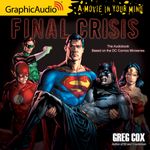Final Crisis (Audio and Graphic Novel)
After listening to Stop Motion, I picked up the “Graphic Audio” adaptation of Final Crisis.

And of course having it all together avoids the problem of delays between chapters that plagued the original release, though that’s true of the collected edition too.
A lot of that is probably the novelization it was based on. It credits the story only to Greg Cox, with no mention of Grant Morrison or any of the artists, which is disappointing. But I don’t think it would work well as a book. The voice acting, music and sound make up for a lot of the lost visual punch and visual structure of the story, and it needs more than just the words.
The acting is compelling, and I found myself more interested in several of the characters as a result: particularly Renee Montoya as the Question, who moves in and out of the story in a number of places, but we actually get to see (or hear) what she’s doing rather than have to piece it together from a panel here and a panel there.
Alterations
One of the weird things is that it incorporates some of the tie-ins, but excludes the one that actually sets up Mandrakk. The Black Lightning/Tattooed Man story from “Submit” is included, along with the framing sequence from the Batman crossover. Those are good choices. “Submit” is a breakneck story that shows what’s going on at the street level when Darkseid takes over, and “Last Rites” clarifies what’s happening to Batman in the Evil Factory
But Superman getting recruited for a multiversal quest to stop Mandrakk, setting up the villain who appears in the final chapter? Completely missing. As a result, Mandrakk appears almost out of nowhere. Superman’s absence during the invasion is explained by having Brainiac 5 recruit him directly from Lois’ hospital room, sending him off to Legion of Three Worlds, and Ultraman’s appearances at the end are replaced with Mandrakk’s co-conspirator Monitor. It streamlines the story, but I think it streamlines it a little too much.
Anti-Life
The Anti-Life Equation is so terrifying because it’s not just mind control, it compels the surrender of free will. Those who have submitted spout slogans about how it justifies anything, how it’s so much easier than the struggles of life and love. It’s insidious, because psychological research has shown that decisions do take effort, and it is easier to offload tough decisions to a schedule, a policy, a leader, etc. The brain likes taking shortcuts around cognitive load.
There’s an appeal to never having to worry about making the wrong choice.
But we want to be able to make choices.
Darkseid Is
Another interesting thing about Final Crisis is how much damage Darkseid does just by existing. He doesn’t do any traditional super villain things in the entire story. No battles, no plotting. He just sits on his throne, taking advantage of a battle he already won, imposing his will on an entire planet and pulling it into a singularity. He spends most of the story sitting in an underground bunker, but his presence presses down on the world.
And he’s damn hard to kill. It takes Batman with a magic bullet, two Flashes leading a manifestation of death, Wonder Woman’s Lasso of Truth, and Superman producing the exact counter-frequency to cancel out what remains of Darkseid’s soul’s quantum waveform as it lingers for months, continuing to drag Earth into oblivion.
Metal
But wow, I’m really seeing the parallels with Dark Knights: Metal even more strongly than when I was just comparing to memory.
Barbatos, like Darkseid, takes over the world between issues, and we jump to a handful of heroes mounting a desperate resistance. The keystone of the multiverse – conveniently the main DC Earth – is in danger of being pulled “downward” into an unending hell. And everyone’s fighting twisted versions of the heroes.
They’re a lot more alike than any of the Crisis events are to each other or to Metal.
Update: As of 2020, none of the DC Comics adaptations are available on Graphic Audio’s site anymore. I’m guessing the license expired or something.